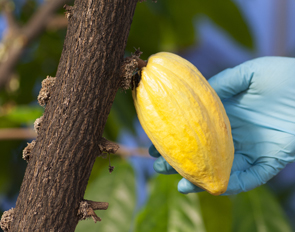Securing the future of chocolate – new home for Reading's Cocoa Quarantine Centre
Release Date 19 January 2015

A University of Reading facility which is helping to safeguard the future of chocolate has a new home after moving to a state-of-the-art greenhouse.
Reading's International Cocoa Quarantine Centre (ICQC), the only facility of its type in the world, has been ensuring cocoa producing countries receive varieties that are free from pests and diseases for nearly 30 years.
ICQC's new home moves 400 genotypes into a single, improved greenhouse and should make the quarantine process more efficient, cheaper and greener.
With demand for cocoa products, especially chocolate, surging, particularly in the Asia-Pacific region, there are growing supply problems in the global chocolate industry. This is compounded with the fact that over 30% of global cocoa production is lost through major pests and diseases. An investment of nearly £1m, the new ICQC is a pivotal part of an international effort to combat supply problems.
One of the major suppliers of cocoa is West Africa. The region produces over 70% of the cocoa used for chocolate worldwide. The crop is crucial to the local economy, bringing considerable resources to the region and employing over 1.5 million people.
After two years in quarantine, clean and safe cocoa cuttings are shipped from Reading to some 20 different cocoa-producing countries, including several in West Africa. These can then be incorporated into breeding programmes to create new varieties with higher yields and greater pest and disease resistance.
Professor Paul Hadley heads up the University of Reading's cocoa programme. He said: "The work and research undertaken at the University has never been more important. Demand for cocoa is going up and up, particularly in countries like China where the standard of living is increasing and people are getting a taste for some of these confectionery products.
"In South and Central America, the centre of cocoa origin, two major diseases, Frosty pod and Witches' Broom disease have had a major impact on commercial production. If these diseases spread to other cocoa producing regions such as West Africa it would absolutely devastate the industry. Therefore, safe movement of cocoa via ICQC is of paramount importance."
The University of Reading's role in ensuring the sustainability of cocoa production extends beyond ICQC.
"Other crucial Reading research includes examining the impact of climate change to cocoa," continued Professor Hadley. "We also work with research institutes in cocoa-producing countries to understand how growing practices can be improved."
